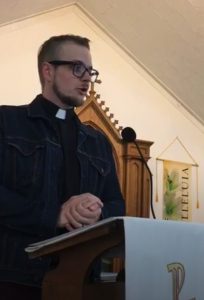The ELCA recognizes June, 17 as day of Commemoration of the Emanuel 9 and a Day of Repentance of Racism. This blog is featured as part of a series to call the ELCA to address white supremacy and racism. To find additional worship materials for June 17, please visit https://www.elca.org/EmanuelNine
3 Then I turned to the Lord God, to seek an answer by prayer and supplication with fasting and sackcloth and ashes. 4 I prayed to the Lord my God and made confession, saying,
“Ah, Lord, great and awesome God, keeping covenant and steadfast love with those who love you and keep your commandments, 5 we have sinned and done wrong, acted wickedly and rebelled, turning aside from your commandments and ordinances. 6 We have not listened to your servants the prophets, who spoke in your name to our kings, our princes, and our ancestors, and to all the people of the land. (Daniel 9:3-6)
I love living and serving as a pastor in rural communities on the Great Plains. I have spent most of my life in this environment, and my family has been part of this landscape for generations. My identity is tied to this place, and that comes with complex realities and shameful truths. Like anywhere in the United States, has been present in this space since the arrival of white people. It takes different forms in different settings, I cannot speak to how it manifests in other rural environments. Rural spaces are not monolithic.
There are, of course, overt displays of white supremacy. People fly confederate battle flags, hang racist symbols in bars while claiming they are, “just being country,” whatever that means. Hate groups hold rallies to intimidate immigrant communities. We have an abundance of statues and landmarks named after men who committed genocide against our indigenous neighbors. Those obvious examples give cover for the quieter, more prevalent, and just as pernicious ways that white supremacy manifests itself into the daily rhythm of our lives.
This landscape is defined by openness. That this openness has tragically created space for my people to hide how white supremacy is alive and well. It is easy not to see migrant workers when they are the only people standing in a field miles from the nearest town or behind the walls of factories processing our food. It is easy to not see the indigenous communities that our presence has forced onto reservations or to ignore the people of color who live in our communities as our neighbors. It is easy to claim that issues facing communities of color don’t affect us because there is just so much space.
The reality is, regardless of how easy it is to look another way white supremacy damages us all. The stories we pass down from generation to generation about how our rugged ancestors came from Europe with nothing. How they were tough and brave enough to “tame the land.” Those stories live on in us, a constant nagging sense of inadequacy. These prideful narratives center on white exceptionalism and yields shame that creates a hardness within us and our communities.
As a result we gloss over the honest parts of these stories, where people were faced with a choice of starvation, conscription, or a boat to a place they had never been. We don’t tell how whole communities shared one window so that everyone’s sod home was up to code when it was to be inspected. We exempt the reality that people of color have been present in every wave of immigration to this area. We certainly don’t spend enough time sitting in the discomfortable truth that we live in this vast and beautiful space only because of the systematic extermination and removal of indigenous people.
I love living and serving here. I delight in meeting our new neighbors who much like large parts of my family, have come fleeing dire situations to find some measure of peace. I am honored when I am invited into holy moments where those whose families have been in this space for thousands of years share their experience with me. I have hope that we can stand against this damaging and pervasive narrative. We value humility, let’s commit to taking an honest look at the ways in which we have participated in the oppression of our neighbors. We value steadfastness, let’s commit to the long process of dismantling white supremacy. We value community, let’s commit to creating a world where those who have been excluded for so long are shown the dignity, justice, and love.

Kelly France is the interim pastor at Swedlanda Lutheran Church in rural Hector Minnesota. In his ministry he seeks to build communities that address the injustices of white supremacy and religious intolerance in the rural Midwest. He serves on the board of the European Descent Lutheran Association for Racial Justice (EDLARJ).
